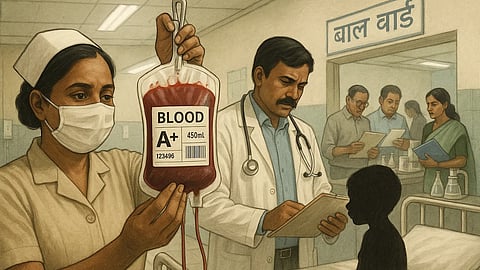Blood Transfusion that led to HIV transmission
In the incident at Sadar Hospital, Chaibasa (West Singhbhum district) in Jharkhand, a 7-year-old child with thalassaemia was reported to have received a blood transfusion in early September 2025 and subsequently tested HIV positive on October 18, 2025, when follow-up screening was done. The child's family alerted and lodged a complaint with the state authorities.
The Jharkhand High Court took suo motu case and have ordered a probe on Friday.
On October 25, 2025, a five-member medical team from Ranchi including Dr. Dinesh Kumar (Director of Health Services), Dr. Shipra Das, Dr. S. S. Paswan, Dr. Bhagat, Dr. Meenu Kumari and Dr. Sushanto Kumar Majhee (Civil Surgeon, West Singhbhum) inspected the hospital’s blood-bank and paediatric ICU ward and found that four more children with transfusions had tested HIV positive, bringing the total to five. Discrepancies were found in the blood bank and have been instructed to clear at the earlies.
On October 26, 2025, Hemant Soren (Chief Minister of Jharkhand) announced via a post on X that the state government had ordered the suspension of the district Civil Surgeon Dr. Sushanto Kumar Majhee.


